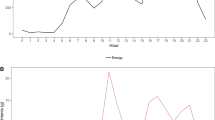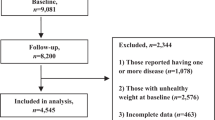Abstract
Background/Objectives:
A potential risk factor for cardiometabolic diseases is irregular or inconsistent eating, however, research on this topic is scarce. We aimed to study associations between irregular consumption of energy intake in meals and cardiometabolic risk factors.
Subject and Methods:
Dietary intake data were derived from 5-day estimated diet diaries of 1768 participants of the National Survey of Health and Development. Energy intakes during predefined meals (breakfast, lunch, dinner, between meals) and daily totals were analyzed using a score for irregularity based on the deviation from the 5-day mean energy intake. Logistic regression models were used to calculate odds ratios (ORs) and 95% confidence intervals (CIs) for having the metabolic syndrome or one of its components. Models were adjusted for sex, physical activity, socioeconomic status, marital status and smoking.
Results:
Irregularity scores of energy intake ranged from 0–160 and were highest for between meals. An increased risk of the metabolic syndrome was associated with more irregular energy intake during breakfast (OR=1.34 (0.99, 1.81); P trend=0.04) and between meals (OR=1.36 (1.01, 1.85); P trend=0.04). Moreover, increased waist circumference was associated with irregular energy intake during breakfast (OR=1.90 (1.47, 2.45); P trend <0.01), evening meal (OR=1.36 (1.06, 1.75); P trend=0.02) and daily total (OR=1.34 (1.04, 1.72); P trend=0.01). No significant associations were found for the other components of the metabolic syndrome.
Conclusions:
Individuals with a more irregular intake of energy, especially during breakfast and between meals, appeared to have an increased cardiometabolic risk.
This is a preview of subscription content, access via your institution
Access options
Subscribe to this journal
Receive 12 print issues and online access
$259.00 per year
only $21.58 per issue
Buy this article
- Purchase on Springer Link
- Instant access to full article PDF
Prices may be subject to local taxes which are calculated during checkout
Similar content being viewed by others
References
Mesas AE, Munoz-Pareja M, Lopez-Garcia E, Rodriguez-Artalejo F . Selected eating behaviours and excess body weight: a systematic review. Obes Rev 2012; 13: 106–135.
Samuelson G . Dietary habits and nutritional status in adolescents over Europe. An overview of current studies in the Nordic countries. Eur J Clin Nutr 2000; 54 (Suppl 1): S21–S28.
Berteus Forslund H, Torgerson JS, Sjostrom L, Lindroos AK . Snacking frequency in relation to energy intake and food choices in obese men and women compared to a reference population. Int J Obes (Lond) 2005; 29: 711–719.
Ekmekcioglu C, Touitou Y . Chronobiological aspects of food intake and metabolism and their relevance on energy balance and weight regulation. Obes Rev 2011; 12: 14–25.
Sierra-Johnson J, Unden AL, Linestrand M, Rosell M, Sjogren P, Kolak M et al. Eating meals irregularly: a novel environmental risk factor for the metabolic syndrome. Obesity (Silver Spring) 2008; 16: 1302–1307.
Shin A, Lim SY, Sung J, Shin HR, Kim J . Dietary intake, eating habits, and metabolic syndrome in Korean men. J Am Diet Assoc 2009; 109: 633–640.
Farshchi HR, Taylor MA, Macdonald IA . Regular meal frequency creates more appropriate insulin sensitivity and lipid profiles compared with irregular meal frequency in healthy lean women. Eur J Clin Nutr 2004; 58: 1071–1077.
Farshchi HR, Taylor MA, Macdonald IA . Beneficial metabolic effects of regular meal frequency on dietary thermogenesis, insulin sensitivity, and fasting lipid profiles in healthy obese women. Am J Clin Nutr 2005; 81: 16–24.
Almoosawi S, Winter J, Prynne CJ, Hardy R, Stephen AM . Daily profiles of energy and nutrient intakes: are eating profiles changing over time? Eur J Clin Nutr 2012; 66: 678–686.
Almoosawi S, Prynne CJ, Hardy R, Stephen AM . Time-of-day and nutrient composition of eating occasions: prospective association with the metabolic syndrome in the 1946 British birth cohort. Int J Obes (Lond) 2013; 37: 725–731.
Almoosawi S, Prynne CJ, Hardy R, Stephen AM . Diurnal eating rhythms: association with long-term development of diabetes in the 1946 British birth cohort. Nutr Metab Cardiovasc Dis 2013; 23: 1025–1030.
Wadsworth M, Kuh D, Richards M, Hardy R . Cohort Profile: The 1946 National Birth Cohort (MRC National Survey of Health and Development). Int J Epidemiol 2006; 35: 49–54.
Prynne C, Nip WF, Almoosawi S, Lennox A . MRC National Survey of Health and Development (MRC NSHD) Dietary data report 2006-11, 2012.
Prynne CJ, Paul AA, Mishra GD, Greenberg DC, Wadsworth ME . Changes in intake of key nutrients over 17 years during adult life of a British birth cohort. Br J Nutr 2005; 94: 368–376.
Price GM, Paul AA, Key FB, Harter AC, Cole D, Day KC et al. Measurement of diet in a large national survey: comparison of computerised and manual coding in household measures. J Hum Nutr Diet 1995; 8: 417–428.
Paul AA Southgate DAT . McCance and Widdowson's The Composition of Foods 4th edn. HMSO: London, UK, 1978.
Holland B Unwin I Buss DH . Third Supplement to McCance and Widdowson's The Composition of Foods: Cereals and Cereal Products. Royal Society of Chemistry: Letchworth, Holland, 1988.
Holland B Unwin I Buss DH . Fourth Supplement to McCance and Widdowson's The Composition of Foods: Milk Products and Eggs. Royal Society of Chemistry: Letchworth, Holland, 1989.
Scientific Advisory Committee on Nutrition. Dietary Recommendations for Energy, 2011.
Grundy SM, Cleeman JI, Daniels SR, Donato KA, Eckel RH, Franklin BA et al. Diagnosis and management of the metabolic syndrome: an American Heart Association/National Heart, Lung, and Blood Institute Scientific Statement. Circulation 2005; 112: 2735–2752.
McCrory MA, McCrory MA, Hajduk CL, Roberts SB . Procedures for screening out inaccurate reports of dietary energy intake. Public Health Nutr 2002; 5: 873–882.
al-Isa AN . Obesity among Kuwait University students: an explorative study. J R Soc Promot Health 1999; 119: 223–227.
McFerran B, Mukhopadhyay A . Lay theories of obesity predict actual body mass. Psychol Sci 2013, 24: 1428–1436.
Garaulet M, Madrid JA . Chronobiological aspects of nutrition, metabolic syndrome and obesity. Adv Drug Deliv Rev 2010; 62: 967–978.
Lissner L, Heitmann BL, Bengtsson C . Population studies of diet and obesity. Br J Nutr 2000; 83 (Suppl 1): S21–S24.
Antunes LC, Levandovski R, Dantas G, Caumo W, Hidalgo MP . Obesity and shift work: chronobiological aspects. Nutr Res Rev 2010; 23: 155–168.
Astbury NM, Taylor MA, Macdonald IA . Breakfast consumption affects appetite, energy intake, and the metabolic and endocrine responses to foods consumed later in the day in male habitual breakfast eaters. J Nutr 2011; 141: 1381–1389.
Timlin MT, Pereira MA . Breakfast frequency and quality in the etiology of adult obesity and chronic diseases. Nutr Rev 2007; 65 (6 Pt 1): 268–281.
Stalenhoef AF, de Graaf J . Association of fasting and nonfasting serum triglycerides with cardiovascular disease and the role of remnant-like lipoproteins and small dense LDL. Curr Opin Lipidol 2008; 19: 355–361.
Nordestgaard BG, Langsted A, Freiberg JJ . Nonfasting hyperlipidemia and cardiovascular disease. Curr Drug Targets 2009; 10: 328–335.
Fontana A, Copetti M, Mazzoccoli G, Kypraios T, Pellegrini F . A linear mixed model approach to compare the evolution of multiple biological rhythms. Stat Med 2013; 32: 1125–1135.
Rothman KJ . No adjustments are needed for multiple comparisons. Epidemiology 1990; 1: 43–46.
Thompson FE Subar AF . Dietary assessment methodology. Nutrition in the Prevention and Treatment of Disease, 2nd edn. Elsevier: Amsterdam, The Netherlands, 2008.
Bingham SA, Gill C, Welch A, Cassidy A, Runswick SA, Oakes S et al. Validation of dietary assessment methods in the UK arm of EPIC using weighed records, and 24-hour urinary nitrogen and potassium and serum vitamin C and carotenoids as biomarkers. Int J Epidemiol 1997; 26 (Suppl 1): S137–S151.
Henderson L, Gregory J, Irving K, Swan G . National Diet and Nutrition Survey: Adults Aged 19 to 64 years. Volume 2: Energy, Protein, Carbohydrate, Fat And Alcohol Intake. Food Standards Agency, Department of Health: London, UK, 2002.
Bates B, Lennox AM, Prentice A, Bates C, Swan G . Headline Results from Years 1, 2 and 3 (combined) of the Rolling Programme (2008/2009- 2010/11). National Diet and Nutrition Survey: London, UK, 2012.
Erren TC, Reiter RJ . A generalized theory of carcinogenesis due to chronodisruption. Neuro Endocrinol Lett 2008; 29: 815–821.
Steptoe A, Pollard TM, Wardle J . Development of a measure of the motives underlying the selection of food: the food choice questionnaire. Appetite 1995; 25: 267–284.
Acknowledgements
We are indebted to all the members who took part in the NSHD. This work was supported by the MRC grant numbers U1200632239 and U123092720. GKP and AMS designed the research; GP conducted the research and analyzed data; GKP, RH and AMS wrote the paper.
Author information
Authors and Affiliations
Corresponding author
Ethics declarations
Competing interests
The authors declare no conflict of interest.
Rights and permissions
About this article
Cite this article
Pot, G., Hardy, R. & Stephen, A. Irregular consumption of energy intake in meals is associated with a higher cardiometabolic risk in adults of a British birth cohort. Int J Obes 38, 1518–1524 (2014). https://doi.org/10.1038/ijo.2014.51
Received:
Revised:
Accepted:
Published:
Issue Date:
DOI: https://doi.org/10.1038/ijo.2014.51
Keywords
This article is cited by
-
The effects of meal patterns on liver steatosis, fibrosis, and biochemical factors in patients with nonalcoholic fatty liver disease: a randomized controlled clinical trial
Journal of Diabetes & Metabolic Disorders (2024)
-
Time-related meal patterns and breakfast quality in a sample of Iranian adults
BMC Nutrition (2023)
-
Association between irregular daily routine and risk of incident stroke and coronary heart disease in a large Japanese population
Scientific Reports (2022)
-
Reversion to regular diet with alternate day fasting can cure grade-I non-alcoholic fatty liver disease (NAFLD) in high-fructose-intake-associated metabolic syndrome
Egyptian Liver Journal (2021)
-
Association of dietary behaviors, biochemical, and lifestyle factors with metabolic phenotypes of obesity in children and adolescents
Diabetology & Metabolic Syndrome (2020)



